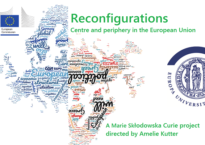Panel: Peripheralization and Peripheral Selves in Liminal Zones of the 21st Century
The panel ‚Peripheralization and Peripheral Selves in Liminal Zones of the 21st Century‘ will be hosted by Dr Amelie Kutter and Dr Gautam Chakrabarti at the…
The panel ‚Peripheralization and Peripheral Selves in Liminal Zones of the 21st Century‘ will be hosted by Dr Amelie Kutter and Dr Gautam Chakrabarti at the…
Auf der Studierendenkonferenz ‚European peripheries‘, veranstaltet von Amelie Kutter an der Europa-Universität Viadrina am 18. Juli 2023, präsentierten Studierende ihre kollaborative Arbeit zu Trends der Peripherisierung in EU-Grenzregionen.

The contributions to the symposium seek to highlight peripherisation and peripherality as a backgrounded disposition of current struggles over sovereignty.
Vortrag von Amelie Kutter und Gesine Lenkewitz auf der 7. CADAAD Konferenz
The Eurozone crisis brought about a new form of party political opposition in Europe that is deeply critical of the current institutional setting of the EU and the EU’s approach to crisis management while, at the same time, generally supporting the European project. This paper investigates discourse practices employed by such ‘euroalternativist opposition’ (Fitzgibbon 2013), drawing on the example of statements (press releases, speeches and interviews) on EU crisis management addressed to international audiences by SYRIZA between the years 2009-2014.

International workshop organised by Amelie Kutter and the Reconfigurations project at the Viadrina Institute of European Studies, European University Viadrina, Frankfurt (Oder). The workshop investigates current trends of periphery-building in the European context. Contributions from political economy, sociology, political science, history, cultural and discourse studies provide conceptual orientation and empirical depth to peripheries as an emerging transdisciplinary research agenda.
Vortrag von Amelie Kutter im Kolloquium des Instituts für Politikwissenschaft an der Universität Tübingen, 2. November 2016.
Vortrag von Amelie Kutter auf dem Workshop ‚Komplexe Grenzen: Dimensionen, Dynamiken, Technologien‘ veranstaltet von der Arbeitsgruppe ‚Grenztheorien‘ an der Europa-Universität Viadrina, 3.-4. November 2016.

Das Projekt ‚Reconfigurations of centre and periphery in the European Union: a discursive political study‘ untersucht, wie das Verhältnis von Zentrum und Peripherie in der EU seit der Krise neu definiert wird. Es wird von der Europäischen Kommission finanziert und von Amelie Kutter an der Europa-Universität Viadrina in Frankfurt (Oder) geleitet.
The Eurozone crisis and its management called into question the EU’s decision-making capacity and cast doubt on its responsiveness and accountability towards various groups’ and members’ demands. It also ruined the prospects for catch-up that poorer members of the European Union linked to membership and severely damaged the EU’s rationale of cohesion. The project investigates discursive struggles over the adequate management of the Eurozone crisis with regard to how they address the project of developmental catch-up and, thereby, redefine the centre and periphery. It is directed by Amelie Kutter at the European University Viadrina in Frankfurt (Oder).